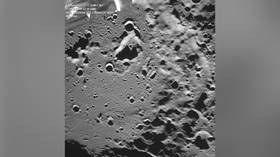Russia reveals reason for Moon crash

The head of Russia’s Roscosmos space agency, Yury Borisov, has revealed the main cause behind the failure of the Luna-25 Moon mission. The probe failed to shut off its engines in time and veered from its intended orbit, the space boss explained.
“Unfortunately, the engine shutdown did not happen normally, in accordance with the sequence diagram, but based on a time stamp, and instead of the planned 84 seconds, it ran for 127 seconds,” Borisov told the Rossiya 24 broadcaster on Monday.
This factor was the crucial reason behind the failure of the mission, Borisov stated, adding that a special commission had already been established to investigate the incident.
“Preliminary ballistic calculations showed that due to the abnormal operation of the propulsion system, the device moved into an open lunar orbit and, basically, crashed into the surface of the Moon,” the space official said.
Despite the failure of the mission, Russian space engineers received valuable experience while building Luna-25, the Roscosmos head noted. The team “will, of course, take into account all the mistakes that were made during this mission, and I hope that the future missions of Luna-26, 27, and 28 will be successful,” Borisov added.
Luna-25 aimed to land near the lunar south pole, which is known for its rugged terrain. All previous lander missions to the Moon by various nations touched down in its equatorial regions.
The Russian spacecraft successfully reached lunar orbit, sending back high-resolution photos of the Moon. The mission was scheduled to attempt its lunar landing on August 21.












